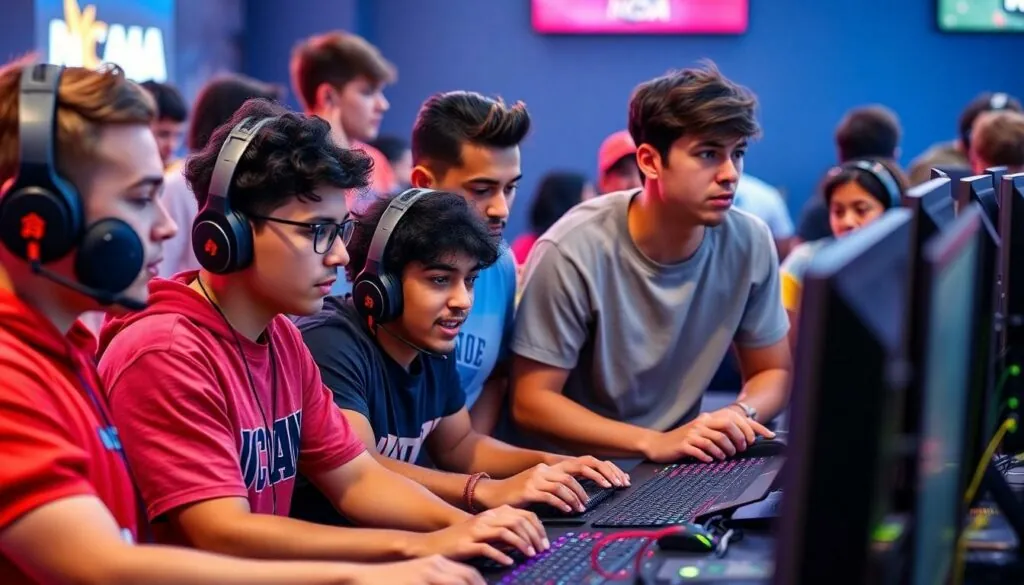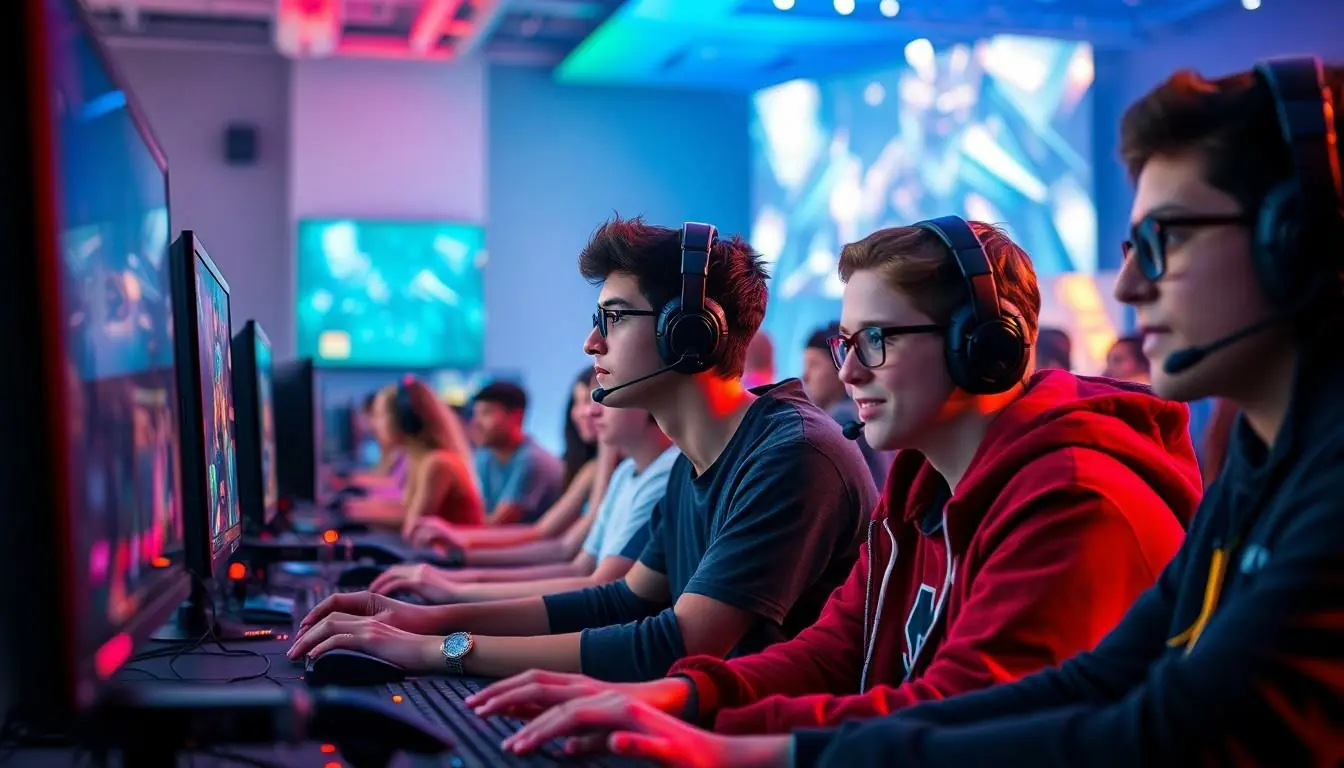Table of Contents
ToggleIn a world where gaming isn’t just a pastime but a competitive arena, NCAA esports is leveling the playing field—literally. Gone are the days when video games were just for basement dwellers and couch potatoes. Now, they’re a legitimate path to scholarships and glory, with colleges racing to recruit the best players like they’re the next LeBron James.
Imagine trading your textbooks for a headset and controller, all while representing your school in epic showdowns. Whether it’s League of Legends or Overwatch, NCAA esports is transforming how students engage with their universities and each other. So, buckle up as we dive into this thrilling blend of strategy, teamwork, and a sprinkle of digital chaos. Who knew that gaming could be this exciting—and educational?
Overview of NCAA Esports
NCAA esports represents a significant development in collegiate athletics, bridging traditional sports and competitive gaming. This sector appeals to diverse student populations, and universities offer scholarships to attract skilled players. Many institutions participate in leagues, fostering competition in games like League of Legends, Overwatch, and Rocket League.
Esports teams cultivate essential skills such as teamwork, strategy, and critical thinking. These experiences enhance students’ academic and social growth. With dedicated facilities increasingly becoming standard at universities, student-athletes benefit from improved training environments.
Participation in NCAA esports has grown considerably, with more than 170 schools now offering esports programs. Many of these programs align closely with existing athletic departments, showcasing the interconnectedness of sports and gaming.
Scholarship opportunities in NCAA esports are becoming more common, providing financial assistance to top-tier gamers. This trend reflects a broader acceptance of esports as a legitimate competitive field, elevating its status among traditional sports.
In the future, NCAA esports is likely to continue expanding, bringing new games and formats into the fold. The ongoing evolution of this domain will attract more universities and students, marking it as a mainstay in the educational landscape. Overall, the integration of esports into collegiate athletics illustrates the changing dynamics of competition and community in the gaming world.
The Growth of NCAA Esports
NCAA esports has experienced remarkable growth, evolving into a significant component of collegiate athletics. This expansion showcases a vibrant blend of competition and engagement.
Popularity Among College Students
College students increasingly gravitate toward esports, drawn by the chance to compete while pursuing their education. Engaging with popular titles like League of Legends and Overwatch forms a connection among peers. Many universities report robust participation rates, with over 170 institutions establishing dedicated esports programs. Scholarships attract talented players, enhancing appeal and fostering commitment. Students gain recognition and build communities around their favorite games while enhancing their skills.
Impact of Technology on Participation
Technology fuels the rapid development of NCAA esports, creating more accessible platforms for participation. Innovations in gaming hardware and broadcasting improve the overall experience for players and viewers. Affordable streaming options enable students to showcase their talents easily. Live-streaming services like Twitch play a vital role in increasing visibility for collegiate esports teams. These advancements not only encourage participation but also engage non-players in the growing esports culture. As technology continues to evolve, so does the landscape of participation in NCAA esports.
NCAA Esports Initiatives
NCAA esports initiatives focus on establishing a structured environment for competitive gaming at the collegiate level. These initiatives encourage student engagement and foster growth in esports programs nationwide.
Official Tournaments and Competitions
NCAA organizes official tournaments focused on popular titles like League of Legends and Overwatch. Participants from member institutions compete in seasonal leagues, providing an opportunity to showcase their skills and build their esports profiles. Events attract significant attention, creating a platform for athletes to gain exposure and recognition. Success in tournaments fosters teamwork and enhances strategic thinking among players. The competitive landscape continues to evolve, with more universities actively seeking to participate in these events.
Partnerships with Game Developers
NCAA collaborates with game developers, strengthening the foundation of collegiate esports. Partnerships aim to create tailored experiences that enhance gameplay and promote fair competition. Developers provide resources, technical support, and opportunities for player engagement within academic settings. Through these partnerships, universities gain access to exclusive content and promotional materials, furthering the reach of esports programs. Engaging with industry leaders reinforces the legitimacy of collegiate esports while benefiting students and institutions alike.
Benefits of NCAA Esports
NCAA esports offers numerous advantages that enhance both the educational and social experiences of students.
Skill Development and Career Opportunities
Students cultivate essential skills such as teamwork and strategic thinking through competitive gaming. Players learn to adapt quickly in fast-paced environments, which prepares them for various career paths in technology and sports management. Esports also fosters communication skills as players collaborate and engage with teammates and opponents. Additionally, colleges provide resources for career development, including networking opportunities with industry professionals. Success in this arena can lead to internships and job placements in game development, event management, or esports marketing. As the industry expands, demand for qualified individuals continues to grow, making these skills highly valuable.
Community and Networking Advantages
Collegiate esports creates a vibrant community among students with shared interests in gaming. Participation in esports teams encourages friendships and supports social integration, especially for those who may feel isolated in traditional settings. Events and tournaments facilitate interaction among players from various schools, building connections that extend beyond college. Networking opportunities also arise through partnerships with game developers and sponsors, exposing students to industry insights. This collaborative environment enables individuals to develop lasting relationships, paving the way for future ventures in the gaming and esports sectors. Engaging in NCAA esports not only enhances camaraderie but also fosters a dynamic community that thrives on shared passions.
Challenges Facing NCAA Esports
NCAA esports faces various challenges as it continues to evolve in the collegiate landscape. Funding and sponsorship issues pose significant obstacles for schools trying to establish or sustain esports programs.
Funding and Sponsorship Issues
Limited budgets often force universities to seek additional funding sources. Traditional athletics departments may struggle to allocate funds specifically for esports. Many schools depend on private sponsorships, which can vary significantly based on regional interest and market dynamics. Opportunities for securing sponsorships can be inconsistent, making financial planning difficult. Some institutions have successfully partnered with gaming brands to gain support, while others lack the resources to attract sponsors. Consequently, disparities across programs can occur, leaving some esports teams underfunded.
Balancing Competitive Integrity
Competitive integrity remains a critical issue in NCAA esports. Ensuring fair competition among student-athletes requires strict adherence to rules and regulations. Participants must navigate complex eligibility requirements that can differ from traditional sports. Recruitment practices can lead to ethical concerns, especially when players’ abilities vary widely based on access to resources. Maintaining a level playing field is essential for fostering a positive environment and sustaining interest in the sport. Institutions need to implement transparent policies regarding recruitment and competition to uphold integrity. Consistent oversight from the NCAA can support efforts to address these concerns.
Conclusion
NCAA esports is reshaping the landscape of collegiate athletics by merging traditional sports with competitive gaming. As more universities embrace this trend, students gain valuable opportunities to showcase their skills while pursuing their education. The growth of esports programs not only enhances student engagement but also fosters a sense of community among participants.
While challenges like funding and maintaining competitive integrity persist, the future of NCAA esports looks promising. With ongoing support from institutions and partnerships with game developers, the sector is poised for further expansion. As esports continues to evolve, it will undoubtedly play a pivotal role in the academic and social development of students across the nation.





